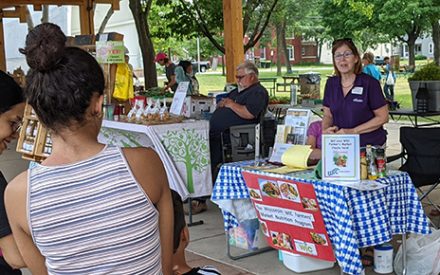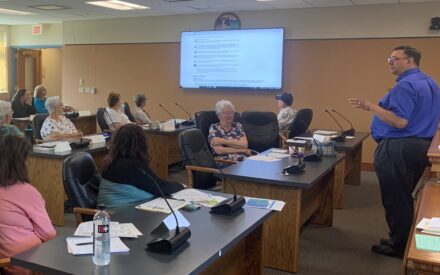Two of the largest barriers people using Supplemental Nutrition Assistance Program benefits, called “FoodShare” in Wisconsin, face at farmers’ markets are the lack of availability of Electronic Benefits Transfer (EBT) systems and the lack of awareness that EBT programs exist. In 2022, farmers’ markets redeemed only 0.02% of all FoodShare benefits distributed in Wisconsin. To expand access to local farmers’ markets in communities with limited incomes, Extension FoodWIse programs increase not only the availability of EBT programs but also increase the awareness that SNAP participants have of EBT programs at farmers’ markets.
Multilevel interventions are strategies that aim to simultaneously address the multiple factors that contribute to adverse health outcomes. Such strategies may, for example, integrate interventions aimed at influencing behavior change at the individual level while also working to change policies and physical and social environments influencing health.
In 2017, FoodWIse began the EBT @ Farmers’ Market project, working with farmers’ markets across the state to help develop and implement policy, systems, and environmental changes that allow more people who use FoodShare to redeem their benefits at farmers’ markets. In 2018, FoodWIse also began a multilevel intervention approach to increase FoodShare users’ access to farmers’ markets, adding an in-market educational component and a social marketing campaign. The EBT @ Farmers’ Market project, Discover Wisconsin Farmers’ Markets tours, and the Farmers’ Market Digital Ad campaign are three intersecting interventions that help improve SNAP recipients’ ability to use their FoodShare benefits at farmers’ markets.
Creating and Sustaining Equal Access to Fresh, Local Foods
As part of the EBT @ Farmers’ Market project, FoodWIse colleagues worked one-on-one with 48 farmers’ market managers and individual vendors to increase the use of SNAP benefits at markets. FoodWIse colleagues supported and provided technical assistance to implement and sustain EBT systems at markets and, in some areas, supported the development and implementation of market match and other incentive programs designed to increase the buying power of SNAP/EBT benefits.
In two-thirds of EBT @ Farmers’ Market projects, FoodWIse staff helped farmers’ markets begin, expand, or reintroduce EBT systems. In about half of these projects, FoodWIse helped markets start programs that provide customers using FoodShare with financial incentives for purchasing fruits and vegetables. In over 40% of projects, FoodWIse also helped develop marketing materials to advertise EBT as a payment option in their local communities and the introduction of point-of-purchase prompts advertising the acceptance of EBT at markets.
Direct Education
Discover Wisconsin Farmers’ Markets tours help familiarize Wisconsin residents who use FoodShare with their local farmers’ market. The guided tours are designed to increase participants’ confidence in being at farmers’ markets, speaking with vendors, selecting produce that works for their families and budgets, and using FoodShare at markets. Over the five years of this project, 465 people participated in tours at 35 different market sites. After the tour, participants reported feeling significantly more confident that they could use their benefits to buy fresh produce at a local farmers’ market.
Social Marketing
The Farmers’ Market Digital Ad Campaign targeted areas around 78 farmers markets in 51 communities and reached significant numbers of both English- and Spanish-speaking FoodShare- eligible audiences around the state. Through social media ads, both in communities with active EBT @ Farmers’ Market projects and with pre-existing EBT programs, FoodWIse increased the communities’ knowledge that SNAP benefits can be used at farmers’ markets. These ads successfully communicated information about using EBT to purchase produce at local farmers’ markets and encouraging FoodShare users to do so.
Intersecting Interventions for Maximum Impact
Collectively, these three interventions addressed two of the largest barriers to farmers’ market usage by SNAP recipients – the availability of Electronic Benefits Transfer (EBT) programs and the awareness that SNAP participants have of EBT programs at farmers’ markets. Multilevel interventions work synergistically to promote more effective, permanent change than interventions working in isolation. By working to increase knowledge and confidence while also creating organizational and behavior change, the interventions were together more effective in addressing barriers to access than any one intervention alone.





